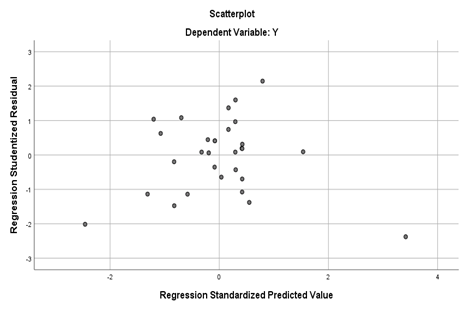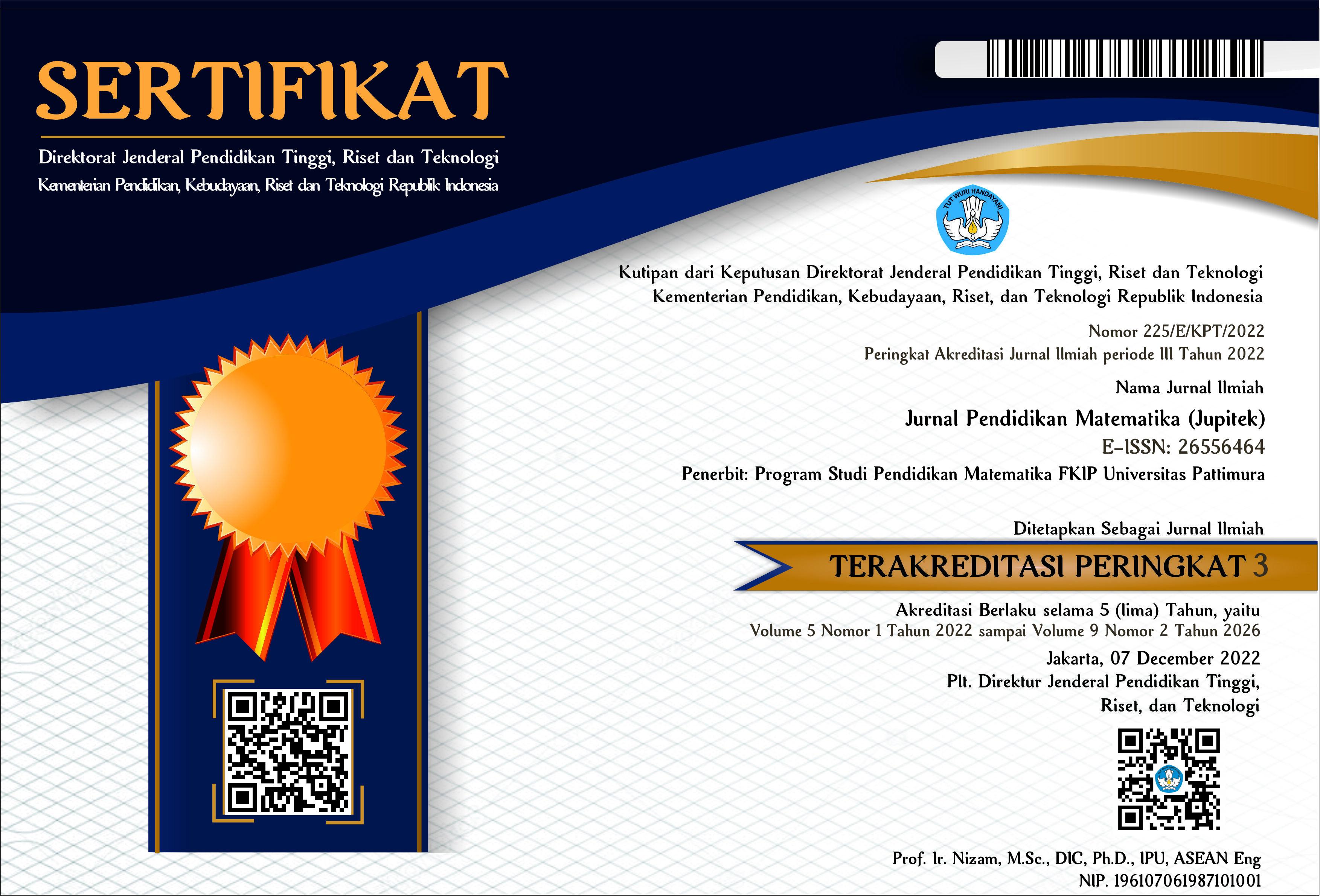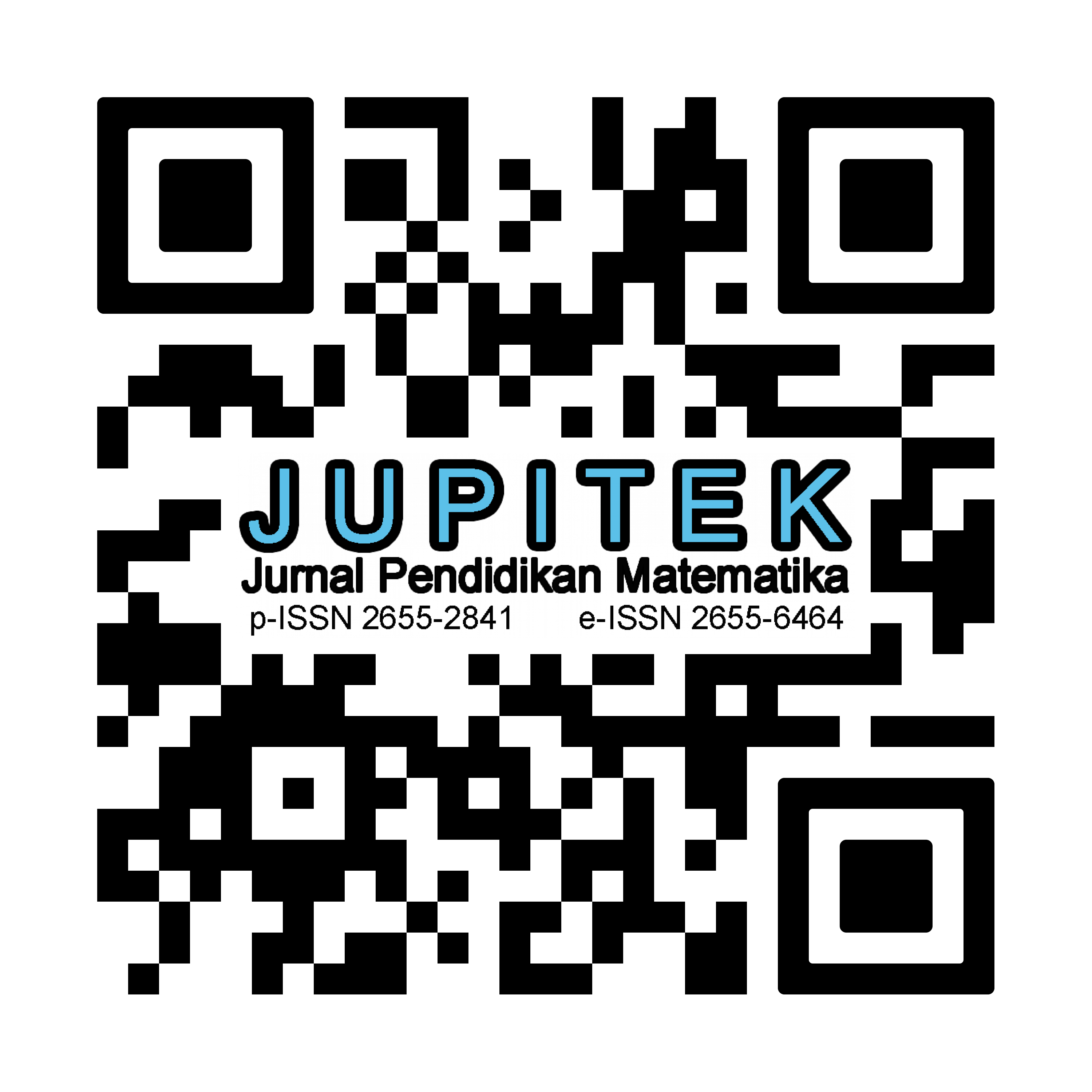SELF-EFFICACY AND SELF-ESTEEM AGAINST MATHEMATICAL COMMUNICATION ABILITY
Abstract
An important aspect that students must possess is good self-efficacy and self-esteem. Several indicators that support achieving these goals are found in self-efficacy and self-esteem to gain students' mathematical communication. The main objective of this research is to determine whether the mathematical communication ability of class VIII students of SMP Negeri 4 Buton Tengah can be jointly affected by self-efficacy and self-esteem. This research is ex post facto research with a quantitative approach. The population in this study were all class VIII SMP Negeri 4 Buton Tengah, with a total of 149 students with a total sample of 30 students obtained using the proportional random sampling technique-data collection techniques using questionnaires and tests. Data analysis used inferential analysis using F-test and t-test. The results of this study are as follows : (1) The mathematical communication ability of class VIII students of SMP Negeri 4 Buton Tengah is significantly affected by self-efficacy and self-esteem with F_count=5,625< 3,34=F_tab ; (2) Mathematical communication ability are not significantly affected by self-efficacy with t_count=0,296> 2,052=t_tab; (3) Mathematical communication ability is significantly affected by self-esteem witht_count=31,82< 2,052=t_tab.
Downloads
References
Aminah, S., Wijaya, T. T., & Yuspriyati, D. (2018). Analisis kemampuan komunikasi matematis siswa kelas viii pada materi himpunan. Jurnal Cendekia: Jurnal Pendidikan Matematika, 2(1), 15-22.
Aspriyani, R. (2020). Self esteem siswa terhadap kemampuan komunikasi matematika. JPPM (Jurnal Penelitian dan Pembelajaran Matematika), 13(2), 285-297.
Azhari, D. N., Rosyana, T., & Hendriana, H. (2018). Analisis kemampuan komunikasi matematis siswa smp berdasarkan gender dan self concept. JPMI (Jurnal Pembelajaran Matematika Inovatif), 1(2), 129-138.
Hadi, S., & Novaliyosi, N. (2019, November). TIMSS Indonesia (Trends in international mathematics and science study). In Prosiding Seminar Nasional & Call For Papers.
Hamidah, H. (2010). Pengaruh Self Efficacy terhadap Kemampuan Komunikasi Matematis. Prosiding Seminar Nasional, Penelitian, Pendidikan dan Penerapan MIPA, 79-84. Fakultas MIPA, Universitas Negeri Yogyakarta.
Hendriana, H., & Kadarisma, G. (2019). Self-efficacy dan kemampuan komunikasi matematis siswa SMP. JNPM (Jurnal Nasional Pendidikan Matematika), 3(1), 153–164.
Hendriana, H., Sumarmo, U., Rohaeti, E. E. (2013). Kemampuan Komunikasi Matematik Serta Kemampuan dan Disposisi Berpikir Kritis Matematik. Delta-Pi: Jurnal Matematika dan Pendidikan Matematika, 2(1), 35-45.
Herdiana, H., Rohaeti, E. E., & Sumarmo, U. (2017). Hard Skills dan Soft Matematika Siswa. Bandung: Refika Aditama.
Julia, Y. (2017). Pengaruh self esteem terhadap aktivitas belajar kelas XI IPS di SMA Santo Fransiskus Asisi Pontianak. Jurnal Pendidikan dan Pembelajaran Khatulistiwa (JPPK), 6(10).
Julita, S., Herawaty, D., & Gusri, S. A. (2019). Pengaruh Kecerdasan Emosional, Dan Self Efficacy Terhadap Kinerja Guru Matematika. Jurnal Pendidikan Matematika (JUPITEK), 2(1), 31-34.
Maspe, P. W., & Dassa, A. (2021, December). The Effect of Self-efficacy and Self-esteem on Students’ Mathematical Communication Skills. In International Conference on Educational Studies in Mathematics (ICoESM 2021) (pp. 409-415). Atlantis Press.
Muklis, Y. M., & Sanhadi, K. C. D. (2016). Kontribusi Self-Efficacy Dan Kemampuan Komunikasi Matematis Terhadap Prestasi Belajar Matematika Siswa. Konferensi Nasional Penelitian Matematika dan Pembelajarannya (KNPMP 1), 412-419. Universitas Muhammadiyah Surakarta.
Nada, Q., Darmawan, P., & Yohanes, B. (2022). Analisis Kemampuan Komunikasi Matematis Siswa Smp Pada Materi Segitiga Dan Segiempat. Prosiding: Konferensi Nasional Matematika Dan IPA Universitas PGRI Banyuwangi, 2(1), 77-85.
Nasution, H. F. (2013). Pembelajaran dengan pendekatan matematika realistik (PMR) untuk meningkatkan kemampuan komunikasi matematis dan berpikir kreatif siswa SMP Negeri di Kota Padangsidimpuan (Doctoral dissertation, UNIMED).
Nufus, R. A. dan H. (2017). Hubungan Kemampuan Pemecahan Masalah Matematis dengan Kemampuan Komunikasi Matematis Siswa. Jurnal THEOREMS (The Original Research of Mathematics), 1(2), 82-89.
Nurhanurawati, N., Widyastuti, W., & Ramadhan, R. (2021). Dampak Self-Efficacy Terhadap Kemampuan Kmunikasi Matematis Siswa. Jurnal Magister Pendidikan Matematika (JUMADIKA), 3(2), 51–58.
Pujiastuti, H. (2014). Pembelajaran inquiry co-operation model untuk meningkatkan kemampuan pemecahan masalah, komunikasi, dan self-esteem matematis siswa SMP (Doctoral dissertation, Universitas Pendidikan Indonesia).
Pusat Penelitian Kebijakan. (2021). Risalah Kebijakan: Meningkatkan Kemampuan Literasi Dasar Siswa Indonesia Berdasarkan Analisis Data PISA 2018.
Rachmadini, S., Soenarto, M., & Kurniasih, M. D. (2018). Pengaruh Model Pembelajaran SFE Terhadap Kemampuan Komunikasi Matematis Siswa Keas VII DI SMP N 222 JAKARTA. Seminar Nasional Pendidikan Matematika 2018, 372 - 385. Universitas Muhammadiyah Prof. DR. HAMKA.
Sariningsih, R., & Purwasih, R. (2017). Pembelajaran Problem Based Learning Untuk Meningkatkan Kemampuan Pemecahan Masalah Matematika Dan Self Efficacy Mahasiswa Calon Guru. JNPM: Jurnal Nasional Pendidikan Matematika, 1(1), 163-177.
Setyarini, R., & Atamimi, N. (2011). Self-esteem dan makna hidup pada pensiunan Pegawai Negeri Sipil (PNS). Jurnal psikologi, 38(2), 176-184.
Wardhani, S. & Rumiati. (2011). Instrumen Penilaian Hasil Belajar Matematika SMP Belajar dari PISA dan TIMS. Kementrian Pendidikan Nasional: Pusat Pengembangan dan Pemberdayaan Pendidik dan Tenaga Kependidikan (PPPPTK) Matematika.

Copyright (c) 2023 La Ode Sirad, Farman Farman, Samsiah Samsiah

This work is licensed under a Creative Commons Attribution-NonCommercial-ShareAlike 4.0 International License.
License and Copyright Agreement
By submitting a manuscript to Jurnal Pendidikan Matematika (JUPITEK), the author(s) certify and agree to the following terms:
- Originality and Authority: The submitting author is authorized by all co-authors to enter into this agreement. The manuscript describes original work that has not been published previously in a peer-reviewed journal, nor is it under consideration for publication elsewhere.
- Approval: Its publication has been approved by all author(s) and by the responsible authorities of the institutions where the work was carried out.
- Rights: The authors secure the right to reproduce any material that has already been published or copyrighted elsewhere.
- Licensing and Copyright: Authors retain the copyright to their work.
- License Grant: The authors grant Jurnal Pendidikan Matematika (JUPITEK) the right of first publication, with the work simultaneously licensed under the Creative Commons Attribution-NonCommercial-ShareAlike 4.0 International (CC BY-NC-SA 4.0).
- Self-Archiving: Authors are permitted and encouraged to deposit the published version of their article in institutional repositories, on their personal websites, and other academic platforms, with proper acknowledgment of its initial publication in Jurnal Pendidikan Matematika (JUPITEK).





.png)


